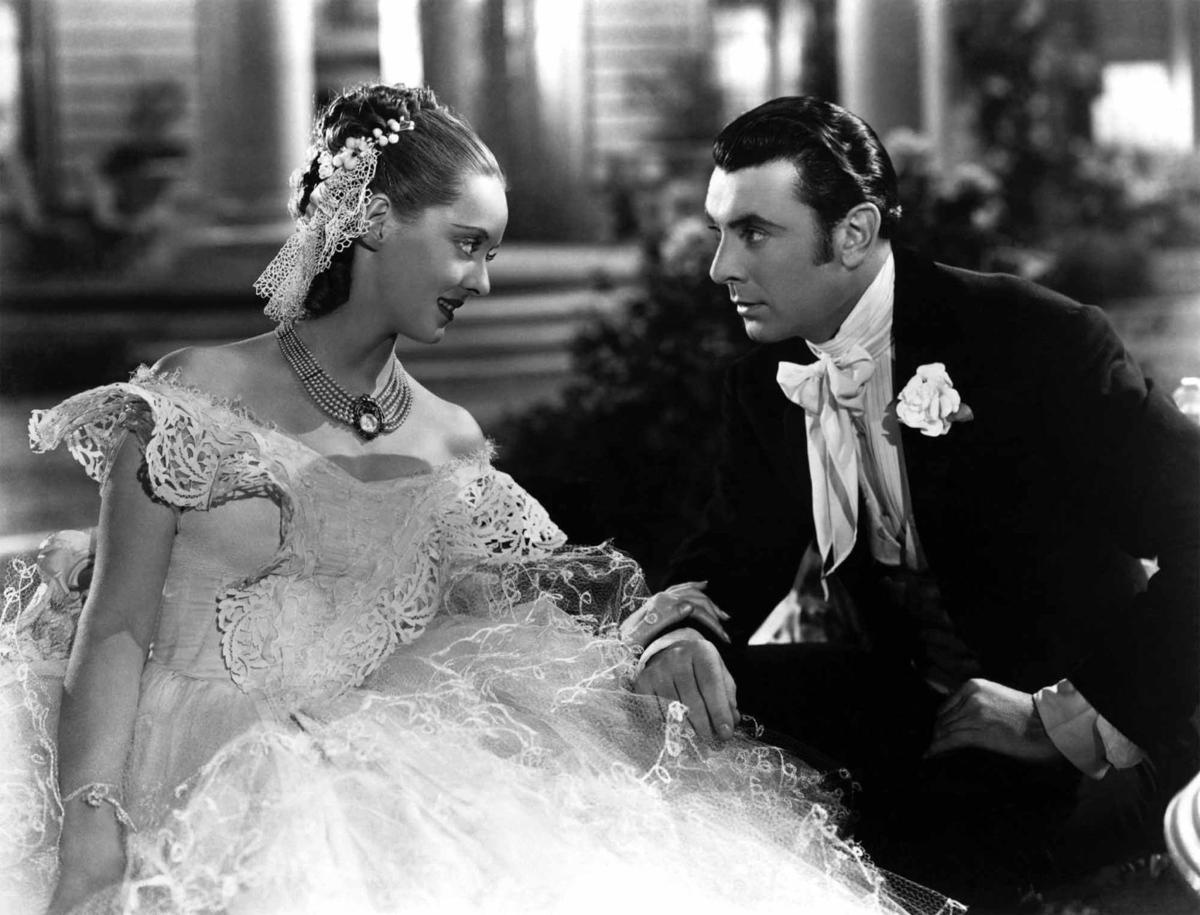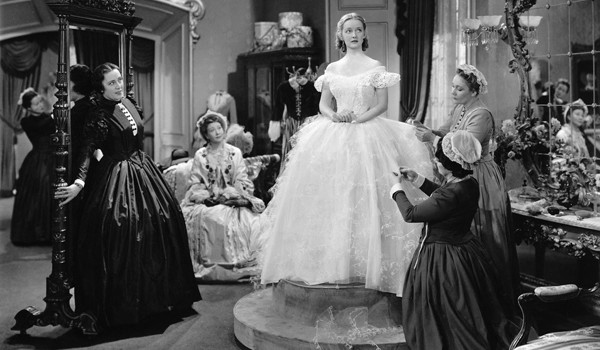I will be watching and reviewing all of the films included on AFI’s 100 Years…100 Passions list. The list contains the 100 greatest love stories in American cinema and I plan to consider how our views on romance and social issues have changed over the years as well as judge whether the romances in these films actually made me swoon. As a fan of the romance genre, I expect to love each and every one of the nominees but I also don’t know if I would consider all of them romantic.
Has it really been 31 years since Bette Davis died? It feels like she’s as big as ever today because she has such a passionate, loyal fanbase. They still feel a connection to the tough, strong willed heroines that she played and admire the woman herself for breaking the mould when it came to what a female movie star could be. Despite her extraordinary eyes and clear, unblemished skin, she was never defined by the way she looked and she suggested that her characters could be appreciated for their spirit and intelligence. She could be a divine bitch who was completely divorced from the laws of reality or a sympathetic diva who was struggling against sexism within the entertainment industry. Her star power allowed her to be equally compelling when playing all of these different roles and audiences flocked to see her films for several decades. Unlike other stars from the Golden Age of Hollywood, she has retained her fanbase and new generations continue to be taken by the image of an uninhibited, troubled woman who brought all of her personal demons into her portrayals of complex women. All of this has been said before but I feel that Davis is the primary talking point when it comes to Jezebel (1938) and you have to scrupulously consider the glory of Davis at the height of her powers.
Jezebel was an important stepping stone in her career and it was meant to serve as a consolation prize for having not secured the role of Scarlett O’Hara in Gone with the Wind (1939). She had already fought with Warner Brothers over the quality of the material that she was receiving and the amount of films that she had to make each year and her eyes had been on the biggest literary adaptation of all time. Every actress in Tinseltown was vying for the role of O’Hara but Davis came closer than a lot of the contenders. Jezebel ended up being treated like a second rate version of the grand epic that was still to come. By most accounts, this was a crushing disappointment for Davis. Despite the anguish that she experienced, her career didn’t really suffer as a result of Jezebel’s release as she won an Academy Award for her performance and bolstered her reputation as a reliable box office draw.
You can’t help but draw parallels between Jezebel and Gone with the Wind and the plots of the two films even seem very similar.

Jezebel concerns arrogant, naughty Southern belle Julie Marsden, Bette Davis, who hurts her public reputation and relationship with banker Pres Dillard, Henry Fonda, when she insists that she be able to wear a scandalous red dress to a ball. This happens after she has been stood up by Pres, who was at an important meeting. She believes that he will return to her soon but instead, he leaves town for an entire year. During this time, Julie accepts that she made mistakes in the past and prepares to apologize to Pres for her actions and ask him to continue their relationship. To her surprise, he has married Amy Bradford, Margaret Lindsay, and this knowledge spurs her to turn the besotted Buck Cantrell, George Brent, against him. Her plan goes awry with disastrous consequences and she ultimately ends up accepting that Pres does not love her even as she sacrifices her health to stay with him.
Gone with the Wind is about Scarlett O’Hara, Vivien Leigh, a sheltered Southern Belle who is secretly tough-as-nails. When the American Civil War occurs she loses everything and is forced use her inner strength to rebuild her beloved Tara. She is married three times, twice to men she doesn’t love, and her passionate affair with Rhett Butler, Clark Gable, ends in tragedy as she is unable to admit she loves him until it is too late. The man that she believes she loves is Ashley Hamilton, Leslie Howard, but he is married to his sweet cousin Melanie Wilkes, Olivia de Havilland, therefore she must scheme to have time alone with him. She opens a lumber mill, has multiple children, and loses both of her parents against the backdrop of the Civil War. Butler ends up leaving her even after she admits that she truly loves him.
Marsden and O’Hara are cut from the same cloth as they are both petulant, manipulative young ladies who mature into women during the American Civil War. They both go through tragedies in their love lives and push the men they love away before desperately trying to get them back. It’s difficult to understand what was so appealing about these characters as audiences during this time tended to want to see virtuous, polite girls on screen. These women were appealing because they defied societal conventions and endured great hardship in order to come of age and blossom into adults. Of course, some may have interpreted both of these stories as cautionary tales about the dangers of acting like one of these women. In their eyes, the only priority that women should have was finding a man to take care of them and both Marsden and O’Hara end up losing the men they love. I think that both characters deserve deeper analysis and you would need to have a narrow viewpoint in order to reduce their character arcs to their relationships with the men in their lives.
Leigh gives one of the best performances of all time in Gone with the Wind and Davis can’t really compete with her but she’s still excellent during the first half of this film. She has to adopt a Southern accent, haughtily declare that she will do whatever she pleases, and express occasional shock and embarrassment when her plans go awry. I love the fact that almost all of our attention is supposed to be focused on Davis during this first half. So often she was plopped into romantic dramas which did not suit her talents. She was giving bravura performances that could overshadow anything occurring around her and that meant that vanilla leading men like George Brent simply failed to register. The narratives of those films didn’t hold water because we never saw why Davis would be attracted to such lightweights and didn’t understand why we couldn’t just watch her cruelly taking advantage of her friends. Sure, Pres is briefly present in Jezebel but William Wyler understands that we’re really here to watch Davis. She maliciously chooses to don that red dress and causes everybody in town to gasp, it’s delicious and our pleasure is uninterrupted by some lousy supporting character.

Fonda is my favorite male actor but he is just set dressing here. We’re more captivated by Davis’s responses to his soft-spoken protestations against her behavior, than the behavior itself. Pres is a wallflower who is able to stay within the upper class because he so willingly tows the line. Marsden stands out and enjoys testing people by being alternately infuriating and seductive. She’s constantly tempting fate and she gets the most enjoyment out of life by dancing on the edge. This means that there is something poignant about the fact that we are seeing her being forced into getting married and leaving her childhood behind. She isn’t even fully cognizant of the fact that she is reaching the end of her salad days and will start to be seriously judged for the scandalous decisions that she makes.
I praise the fact that the film suggests that she is coming to the end of her childhood but the first act abruptly ends and we are plunged into a shoddily put together second act. Marsden is a divine bitch in the first act and Dillard’s rejection of her is meant to set her on the road to changing her ways. The duel that she sets into motion and the spread of yellow fever are meant to compound the feeling that she is responsible for everything bad that has ever occurred within this community. Suddenly she is contrite, regretful, and desperate to become one of the good Christian girls who seem terribly dull. This should have been the first step on a long road to change but instead, we are hit with an abrupt cut and then greeted with a version of Marsden who has completely transformed. Davis just doesn’t get enough time to depict the changes that Marsden is going through and it feels like she is playing completely different characters within the same film.
This is still Davis’s show and I am incredibly thankful for that. I feel like we don’t talk about this film that much anymore when we consider the path of her career and that’s criminal. She’s at the height of her loveliness and really gets to steward the first half of this production. The concept of the actor as an auteur is not often considered but I did feel as though Davis had total influence and control over aspects of this film. I say that in a good way and she turns this into an excellent vanity project. Every low angle shot which highlights her sharp, well-defined cheekbones is perfectly placed and I wasn’t objected when she did everything but slyly wink at the camera. Other performers have tried to dominate productions with detrimental results but you don’t sense that there was a rivalry between Davis and Wyler when they were on set. They work in harmony but she is firmly in the driver’s seat and it’s a joy to see her when she’s absolutely unleashed.

It’s also nice to realize that Wyler didn’t slack off when it came to craftsmanship. I would argue that this film has a problem in terms of not having a great sense of place but the interiors are all well decorated and Wyler lingers on the luxuriousness of all of this without making it seem gauche or tacky. He is a director who knows how to make things look expensive and this doesn’t just look like a pokey little production that has been put together on the cheap. He has a fundamental understanding of what people want out of this sort of film but the script just isn’t strong enough to back him up. I only wish that more resources had been handed to him so that he could raise this up to the level of something as brilliant as Dodsworth (1936).
With all that said, Jezebel is still too flawed to really be considered a classic. Davis fans have likely already seen it multiple times and for those who aren’t initiated, it probably won’t be a great introduction to her work. Something more consistent in terms of quality would be preferable. Perhaps you could present them with something like Now, Voyager (1942) first and then ease them into the messier entries in her filmography. I don’t really understand why it had to make this list. They already included another superior Davis vehicle and I don’t feel like Jezebel has had that much-staying power. People still view it with derision because of its status as an ersatz Gone with the Wind and it doesn’t have much to differentiate it from that film. I have to assume that it did make the list because of the love that AFI voters have for Davis. It didn’t rank very highly and it may have just been a filler but it still seems like an unnecessary choice in hindsight.





